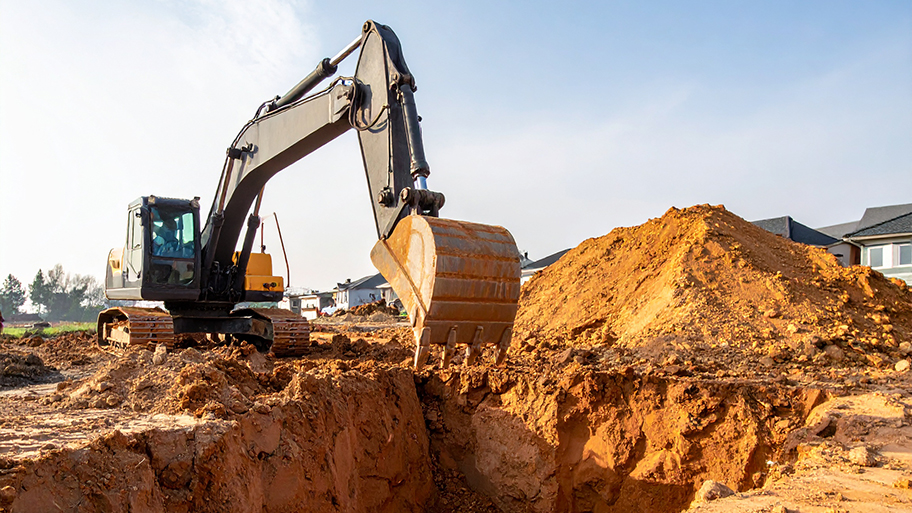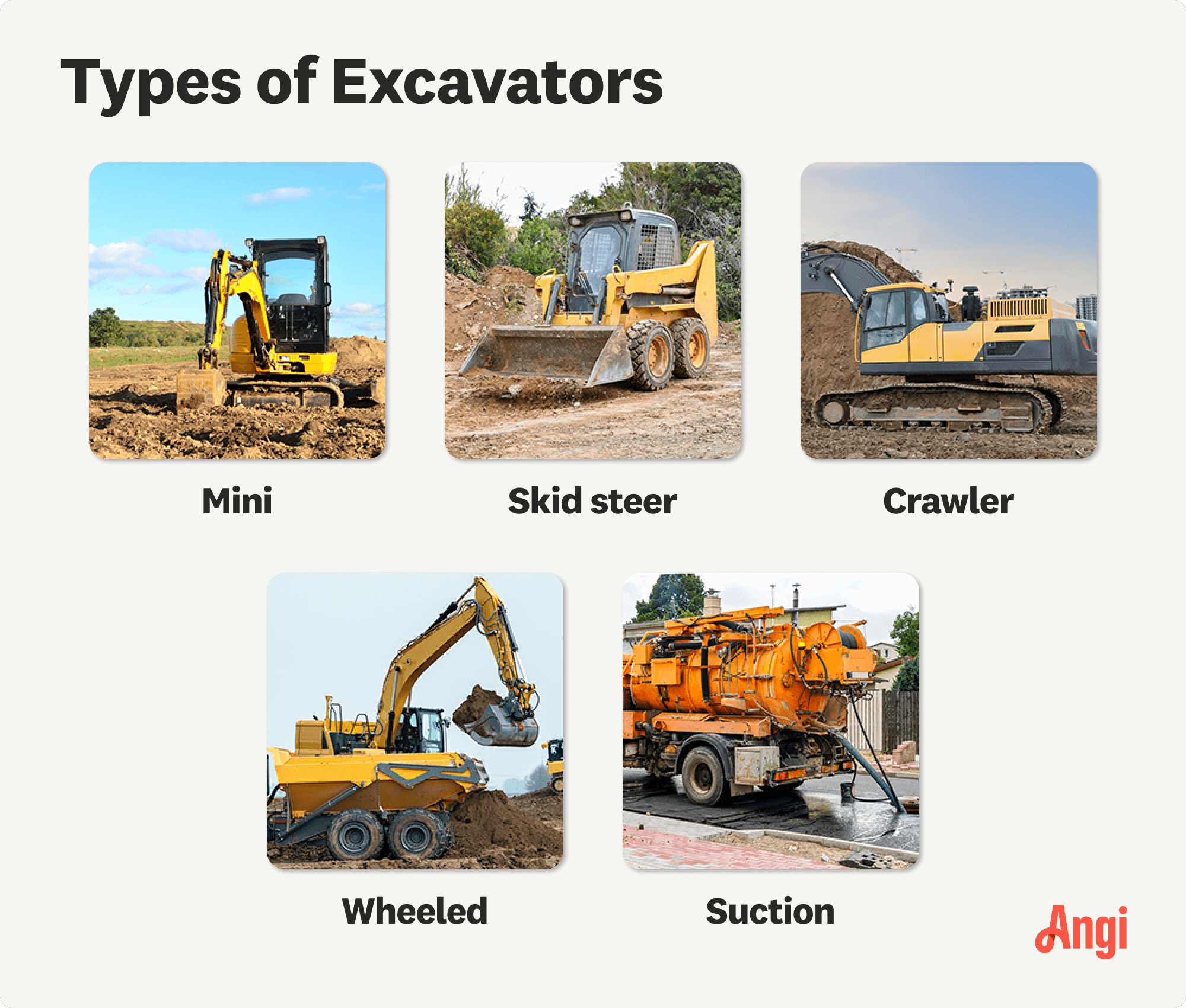
Excavation costs $1,500 to $6,300 for most residential projects—but it depends on factors like the size of the area. This guide will help you plan a budget.
Excavation costs depend on your project and location. Check with a local pro for your specific job.
Most homeowners spend $600 to $8,000 to rent an excavator for a project.
Excavator rentals are charged by the hour, day, week, or month.
You can spend anywhere from $150 to $2,000 per day, depending on the type of excavator you use.
Mini excavators cost $30 to $60 per hour, while suction excavators cost $150 to $220 per hour.
Excavation is a dangerous DIY if you don’t have proper training, so consider hiring a pro.
The average excavator rental price is $4,300, but the final cost can range from $120 for a four-hour rental of a mini excavator to $27,000 for a month-long rental of a suction excavator for complex projects. You can pay up to $2,000 per day or between $600 and $8,000 per week to rent an excavator. The rental prices work out to $3 to $20 per cubic yard for excavation.
Whether you’re digging out space for a new swimming pool or demolishing an old patio for new landscaping, there are several options for renting an excavator. The cost to rent an excavator will depend on the type of excavator, the size of the project, rental time, equipment delivery, and more.

Excavators cost anywhere from $30 to $220 per hour, but the rate depends on the type of excavator. Mini and skid steer are good options for smaller projects, like prepping for fresh landscaping, while larger models like crawlers work well for demolition projects.
| Excavator Type | Rental Price (by Hour) | Description |
|---|---|---|
| Mini | $30–$60 | Compact, widely available, best for DIY |
| Skid steer | $50–$100 | Compact, extension arm, best for narrow or small jobs |
| Crawler | $100–$150 | Larger, requires pro, best for landscaping or grading |
| Wheeled | $120–$180 | Moves faster, best for larger properties with even surfaces |
| Suction | $150–$220 | Best for precise excavations and delicate soil |
If you’re curious about daily excavator rental prices, here’s what to expect:
Mini: $150 to $350 per day
Skid steer: $200 to $600 per day
Crawler: $750 to $1,200 per day
Wheeled: $750 to $1,400 per day
Suction: $1,200 to $1,800 per day
You’ll spend $3 to $20 per cubic yard for excavation. Although you’ll often find excavator rental prices charged by the type of equipment you need and the timeline you need it for, you may also find rentals based on the size of the excavation area.
To rent an excavator, you’ll need to determine how long you’ll need the equipment. Many places offer rentals by the hour, day, week, or month. Keep in mind that while many places offer excavator rental prices by the hour, they may also require a minimum number of hours. You’ll need to agree to a rental time of at least four to six hours in most cases.
| Length of Rental | Cost |
|---|---|
| Per hour | $30–$220 |
| Per day | $150–$2,000 |
| Per week | $600–$8,000 |
| Per month | $2,600–$27,000 |
Before you can begin excavation, you’ll have to take care of several prep tasks. You may need to pay for a land survey and soil testing to make sure the area is safe to drive heavy machinery over, and you’ll need to remove any boulders, trees, or other large obstacles for the excavator to be able to dig out the land.
Here are some common excavation prep costs to expect:
Leveling: $1–$12 per cubic yard
Land survey: $400–$550
Soil testing: $700–$2,200
Boulder removal: $50–$250
Tree removal: $200–$2,000
Many excavator rental companies offer delivery and pickup services so that the machinery can be dropped right off to your home the day you need it. Delivery and pickup prices range from $60 to $100 total for areas within 10 miles of the rental company store, plus $3 to $4 for each additional mile. Some companies build these fees into the rental cost, so be sure to check before signing a rental agreement.
Building permits cost $200 to $2,000 for demolition and outdoor projects. Any time you’re planning to do demolition work or use heavy machinery on your property, you need a building permit. Large projects, like digging out a basement or laying a new foundation, will definitely require prior approvals.
Once you’ve cleared the area, you’ll need to pay $150 to $250 per cubic yard to haul away the dirt. The cost will be higher for rocky or wet soil.

Whether you DIY or hire a pro, excavation costs can add up to thousands of dollars to rent equipment, complete land surveys, secure permits, and haul away the dirt. You may save about $50 to $150 per hour by excavating yourself, but you also risk damaging your yard or even your home’s foundation if you don’t have the proper training to use an excavator. Operating heavy machinery without experience is also a safety risk.
For most excavation projects, it’s important to leave the work to a local excavation company. These pros can help you with all of the prep work and hauling while also completing the excavation as quickly and safely as possible.
There are many different projects you may want to tackle before, during, or after an excavation. Maybe you want to test the soil to make sure it’s safe to excavate, or perhaps you’re excavating to help level out an uneven yard for some landscaping. Here are common projects to consider tackling when planning an excavation and making your budget:
Soil testing cost: $680–$2,160
Foundation installation cost: $4,000–$14,750
Yard leveling cost: $1,000–$3,300
Swimming pool installation cost: $25,200–$58,700
Landscaping cost: $1,250–$6,100
Patio installation cost: $2,000–$6,000
Renting an excavator, and excavating in general, is costly. But if you’re dreaming of installing a new pool by summer or leveling the yard for a new patio or deck, you’ll need to budget for an excavation first. Here are some ways to save money on excavator rental prices.
Consider off-season excavations: If you’re experiencing a mild winter, you may find off-season deals during a slow period for excavation companies. (Just keep in mind that if you have a lot of snow and ice, winter excavations will cost more.)
Choose the right machine for the job: There’s no need to rent a heavy-duty crawler when a mini excavator will do. Save money by choosing the excavator best suited to your project.
Bundle with professional labor: Many times, homeowners can find a better deal by hiring an excavation company to provide the equipment and do the excavation work.
Home is the most important place on earth, which is why Angi has helped more than 150 million homeowners transform their houses into homes they adore. To help homeowners with their next project, Angi provides readers with the most accurate cost data and upholds strict editorial standards. We extensively research project costs to develop the pricing data you see, so you can make the best decisions for you and your home. We rely on reputable sources, including the U.S. Bureau of Labor Statistics, academic journals, market studies, and interviews with industry experts—all to ensure our prices reflect real-world projects.
Want to help us improve our cost data? Send us a recent project quote to [email protected]. Quotes and personal information will not be shared publicly.
From average costs to expert advice, get all the answers you need to get your job done.

Excavation costs $1,500 to $6,300 for most residential projects—but it depends on factors like the size of the area. This guide will help you plan a budget.

Time to get rid of that old chipped and crumbling walkway? Concrete removal costs can add up, but you have options to simplify the process. Learn more here.

How much does it cost to demolish a house? Average prices for demolition vary based on home size, materials, and location. A partial demolition can make a project more affordable than a full house demolition. Keep reading for more.

When prepping a trench, you may ask, “Will a trencher cut through roots?” Learn how a trencher can effectively complete your excavation project with this guide.

Who can dig a trench for you? You can rent trenching equipment for a simple job, but a local excavation company can help with tough ones. Here's how.

Who installs trench drains? A local excavation company is best for the job, but a landscaper or plumber can also get it done. Here's how.